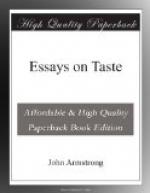till they terminate in the hand of the Divine COMPOSER
of the whole. Let us cast our Eyes first upon
the Objects of the Material World. A rural Prospect
upon the very first Glance yields a grateful Emotion
in the Breast, when in a Variety of Scenes there arises
from the whole ONE Order, whose different Parts will
be found, by the critical Eye of Contemplation, to
relate mutually to one another, and each examined
apart, to be productive of the Necessaries, the Conveniencies,
and Emoluments of Life. Suppose you was to behold
from an Eminence, thro’ a small range of Mountains
covered with Woods, several little Streams gushing
out of Rocks, some gently trickling over Pebbles,
others tumbling from a Precipice, and a few gliding
smoothly in Willow-shaded Rivulets thro green Meadows,
till their tributary Waters are all collected by some
River God of a larger Urn, who at some few Miles distance
is lost in the Ocean, which heaves it’s broad
Bosom to the Sight, and ends the Prospect with an immense
Expanse of Waters. Tell me, EUPHEMIUS, would not
such a Scene captivate the Heart even before the intellectual
Powers discover Minerals in the Mountains; future
Navies in the Woods; Civil and Military Architecture
in the Rocks; healing Qualities in the smaller Streams;
Fertility, that the larger Waters distribute along
their serpentising Banks; Herbage for Cattle in the
Meadows; and lastly, the more easy Opportunities the
River affords us to convey to other Climates the Superfluities
of our own, for which the Ocean brings us back in
Exchange what we stand in need of from theirs.
Now to heighten this beautiful Landscape, let us throw
in Corn Fields, here and there a Country Seat, and,
at proper Distances, small Hamlets, together with
Spires and Towers, as MILTON describes them,
“bosom’d high
in tufted Trees.”
Does not an additional Rapture flow in from this Adjunct,
of which Reason will afterwards discover the latent
Cause in the same manner as before. Your favourite
Architecture will not fail to afford less remarkable
Instances, that Truth, Beauty, and Utility are inseparable.
You very well know that every Rule, Canon, and Proportion
in building did not arise from the capricious Invention
of Man, but from the unerring Dictates of Nature,
and that even what are now the ornamental Parts of
an Edifice, originally were created by Necessity; and
are still displeasing to the Sight, when they are
disobedient, if I may use that moral Expression, to
the Order, which Nature, whose Laws cannot be repealed,
first gave to supply that Necessity. Here I appeal
to your own Breast, and let me continue the Appeal
by asking you concerning another Science analogous
to this, which is founded upon as invariable Principles:
I mean the Science of living well, in which you are
as happily learned as in the former. Say then,
has not every amiable Character, with which you have
been enamoured, been proved by a cool Examination
to contain a beautiful Proportion, in the Point
it was placed in, relative to Society? And what
is it that constitutes Moral Deformity, or what we
call Vice, but the Disproportion which any Agent occasions,
in the Fabric of Civil Community, by a Non-compliance
to the general Order which should prevail in
it?




